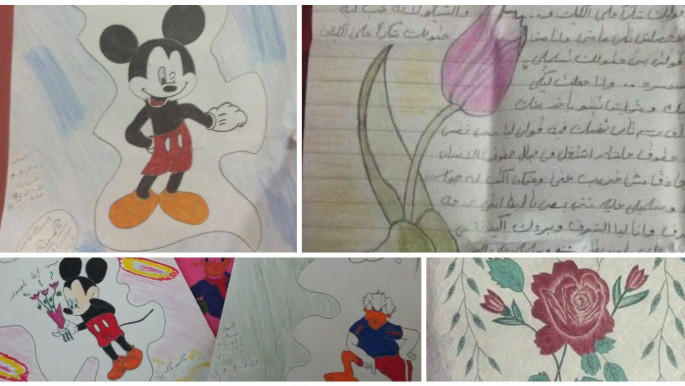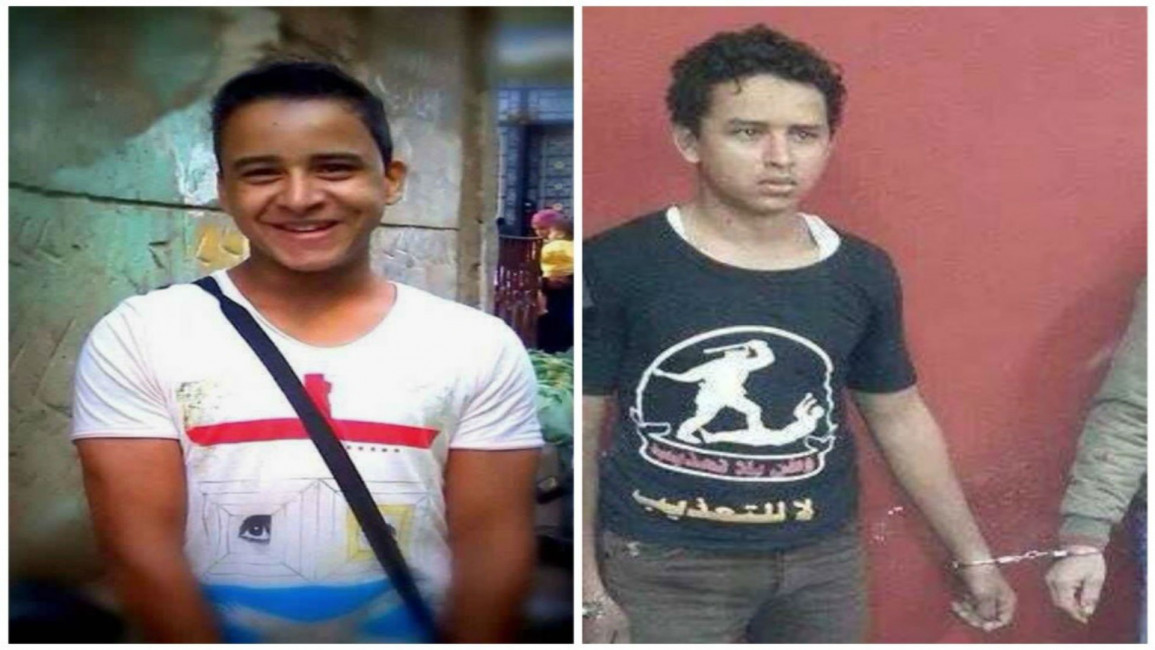A story of teenage resistance in Egypt's prisons
Mahmoud Mohamed Hussein is a 19-year-old high school student who has been imprisoned since 25 January, 2014, for wearing a t-shirt bearing the words: "A nation without torture."
His story has been featured by the media and human rights organisations, but his detention continues to be renewed, without trial, every 45 days.
Mahmoud's story is usually portrayed by showing how young he is, and that he doesn't deserve to be in prison for a t-shirt.
This is indeed true; but it is only part of how a young man such as Mahmoud shows extreme perseverance and strength within the inhumane life of prison. His attitude has grown, and now demonstrates a fierce resistance to the regime and its violent oppression, no longer a succumbing boy who begs for his release.
 |
|
| (Click to enlarge) Mahmoud's drawings from prison, sent to his brother Tarek |
He still seeks his freedom, we all do, but he also understands the importance of what he believes in: the revolution; that he is simply fighting for a cause, and won't give up until he achieves it.
Mahmoud doesn't regret wearing that t-shirt on the third anniversary of the Egyptian revolution. He wasn't a renowned activist, nor is he "just another teenager".
Mahmoud became famous after his prison sentence was issued, not only for being one of the youngest prisoners of conscience in the Middle East, but because his ideas about freedom, despite his young age, and the means he uses to express them, continue to impress us.
I like speaking of Mahmoud as a person who knew what he was doing when he took the street wearing that t-shirt, and I prefer to always show different sides of his personality that the media fails to address.
This is because prison makes a person grow up fast and learns things he could have never been able to learn otherwise. In addition, Mahmoud has become more of a source of inspiration, beyond being an example of the oppression of young people in jail.
Mahmoud started improving his drawing and painting while in his cold cell. He spends most of his time writing long letters, poetry and creating innocent drawings of cartoon characters and flowers to send to everyone who writes to him - whether he knows them or not.
New friendships have been formed with people who hear about him and decide to write to support him, while at the same time, his letters bring much strength and support to his new friends, especially those in other prisons - more people he has never seen or met.
He asks for other detainees' photos, details of how they were imprisoned, and starts making them small gifts and drawings, saying that he even feels more sorry for them than for himself.![]()
 |
|
|
"We can create happiness through love," |
In many of his letters, Mahmoud keeps repeating his hallmark phrase: "We can create happiness with love" - which is exactly what he does.
He knows how to spread love from the small prison cell in which he is jammed.
Through this heart-breaking experience, he has been given the chance to teach us how a person can still hold on to their beliefs, and find ways to spread love and strength and keep faith, all while facing horrific torture.
"I know that my prison time has gone too long," he wrote in a letter to a pen-friend.
"There must be times when we feel depressed, but we should always get rid of this feeling and look at the pain which fills people's hearts, because of all the injustice and bloodshed in our country. We will feel that all that we are facing is because of an idea or a dream, which is even worth our lives.
"I still say that our country is better than any other, because in it, we are the ones who sacrifice for a better, clear beautiful future, where people will unite for good, not evil. All this will happen because God will grant victory to the truth and its people - but we need patience, hope and faith, because they can lead us to victory."
 |
|
| (Click to enlarge) Mahmoud describes the agony and injustice in Egypt in another letter to the author |
In a letter from jail that was published on 8 October 2015, he wrote: "Will I be tried for the sake of a goal, or an idea, or a dream that so many of us have dreamed since the 25 January Revolution of 2011?
"I dreamed and so many youths dreamed with me that oppression, torture and the killing of youths would end. Youths dreamed of living in a nation without torture. That day will come and that dream will be realised in this nation, for which so many youths, young women and men, have spilled their blood, and for which so many remain in jail."
I often think of many questions. Has prison made a hero out of Mahmoud or has it made him grow up to more quickly become the hero he was already meant to be?
Have his beliefs in freedom and social justice made him stronger and capable of bearing almost two years of unjustified imprisonment? Or has prison strengthened those pre-existing beliefs in him and made a resistance figure out of his story?
Oppression indeed creates its own resistance, like antibiotics, in a way. The only truth I am certain of is that oppressive regimes dig their own graves through injustice.
Mahmoud is an example of how imprisonment has failed to silence dissent, but instead has unleashed a source of inspiration to the world, through his art and writing.
As a representative of thousands of detainees, Mahmoud will avenge the oppression and humiliation he has faced, creating a downward spiral of failure for the regime - and its plan to weaken young people's resolve to fight for a better future of bread, freedom and social justice.
For safety concerns, the author of this article prefers to stay anonymous.
Opinions expressed in this article remain those of the author and do not necessarily represent those of al-Araby al-Jadeed, its editorial board or staff.



